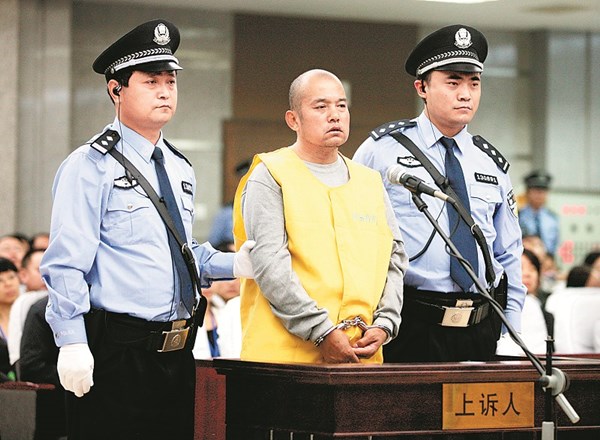Serial killer and rapist executed in Hebei
 |
| Wang Shujin [File photo/Xinhua] |
High-profile serial killer Wang Shujin was executed in Hebei province on Tuesday after his death sentence for rape and intentional killing was approved by the Supreme People's Court.
Wang, a native of Hebei, was sentenced to death for multiple counts of intentional homicide by the Handan Intermediate People's Court in the province on Nov 24.He was also sentenced to 15 years in prison for rape. The court combined the sentences in the death penalty.
Wang appealed, but the Hebei High People's Court rejected his appeal, upholding his convictions and the death sentence. The sentence was then submitted to the Supreme People's Court for review, as all death penalties made by lower courts have to get final approval from the top court.
After the review, the top court found Wang guilty of four rapes, three killings and an attempted killing from 1993 to 1995.
"Wang had been previously imprisoned for rape, but he raped again and did the killings without repentance and correction after his release, meaning his criminal intent as well as personal and social dangerousness were extremely despicable and serious," it said. "Although he turned himself in, he couldn't be leniently penalized."
It acknowledged the ruling made and upheld by the Hebei courts, noting the facts of the case were clear, the evidence to prove Wang's convictions was sufficient, the death sentence appropriate and the trial procedures legitimate.
The Handan court carried out the execution after receiving the review result from the top court. Wang's close relatives refused to meet him, even though the court told them they had the right to do so before the execution, the top court said.
Wang, 53, attracted public attention in 2005 when he was detained and voluntarily confessed to six rapes and murders. In 2007, the Handan court sentenced him to death after finding him guilty of three rapes, two killings and one attempted murder.
The death penalty was upheld by the high court in Hebei in 2013 and then submitted to the top court for review.
In November last year, however, the top court overturned the death penalty and sent the case back to the Handan court for retrial because of newly discovered evidence.
During the rehearing, the Handan court said the new evidence was the result of a DNA test on a skeleton found by police following directions given by Wang. It was related to the rape and murder of a woman surnamed Zhang in 1993 that Wang confessed to while in detention.
But Wang was unhappy, as the result did not include another killing he also claimed to be responsible for in 2005.
In that year, he confessed to raping and killing a woman surnamed Kang in a cornfield in Shijiazhuang, capital of Hebei, in 1994.Although the confession was rejected by the Handan court due to insufficient evidence, it aroused huge public attention because another man, Nie Shubin, had already been sentenced to death and executed for the crimes in 1995.
Wang's confession to Kang's rape and murder prompted a reinvestigation of the case. In December 2016, the top court pronounced Nie not guilty as the evidence in the case was not strong enough to convict him.
In the past decade, Wang still insisted he raped and killed Kang, but the confession was always rejected by the Handan court because his testimony did not match the physical evidence in Kang's case.
In response to public speculation that Wang was using his confession in Kang's case as meritorious service to escape the death sentence, the top court explained on Tuesday that those who reveal others' crimes, instead of their own offenses, after being captured can be identified as having performed meritorious service.
"People who plead guilty to their own crimes can be defined as confessing or giving themselves up," it said. "Additionally, convicts will only be held criminally liable for confessions that are acknowledged by courts."
Another case
Also on Tuesday, the Qinzhou Intermediate People's Court in the Guangxi Zhuang autonomous region carried out the execution of Yang Guangyi, who raped a 10-year-old girl.
Yang, a native of Guangxi, used cruel and violent means to rape the girl, who was on her way home after picking passion fruit to sell in Qinzhou, in 2018. The girl died as a result.
He was sentenced to death for rape by the intermediate court in 2019, but the sentence was changed to a suspended death sentence last year after he appealed, as the Guangxi High People's Court said Yang turned himself in after the rape and thus deserved to be granted some leniency.
The victim's mother appealed and in November the top court ordered the high court to set up a new panel to retry the case.
After the retrial, the high court withdrew its previous ruling, saying Yang was not eligible for lenient punishment because he raped the girl by extremely cruel means, and his action had brought great negative effects to society.
The top court acknowledged the new verdict, saying those who seriously harm children must be harshly punished, including being given the death sentence, under Chinese law.
It also said the approval of Yang's death penalty showed the country's strong determination to deter people from sexually assaulting juveniles.
Before the execution, the intermediate court told Yang that he had the right to apply for a meeting with his relatives, but Yang refused, the top court added.









